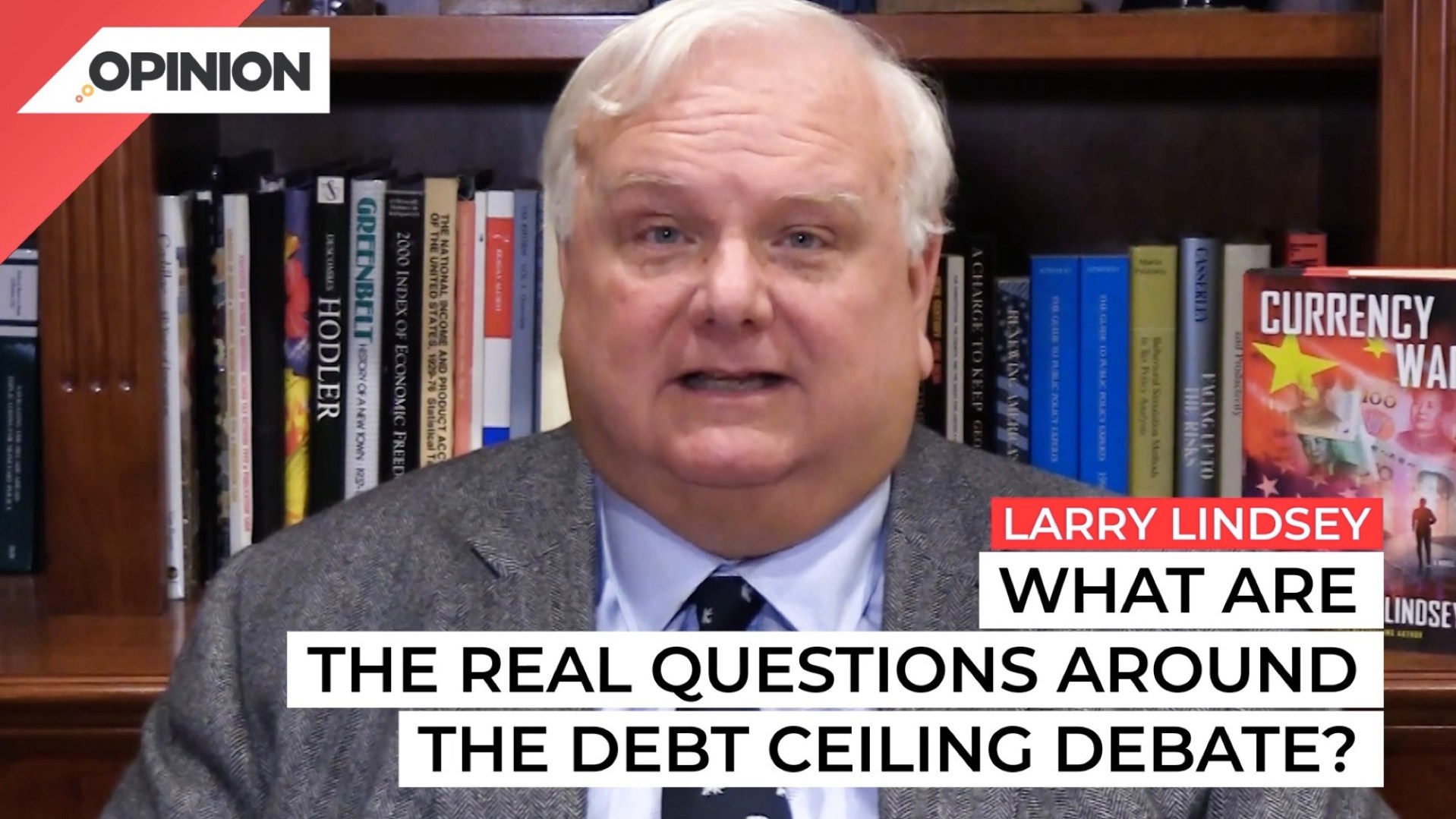
Commentary
-
Our commentary partners will help you reach your own conclusions on complex topics.
This week, the Congress of the United States is going to be voting on raising the so-called debt ceiling. It’s how much the United States government is allowed to borrow. Now let’s face it. The numbers are huge.
Right now, the U.S. debt is more than $25 trillion. It’s about 125% of the size of the economy. And that’s a big number for sure. And they’re probably going to be raising it some more.
Now, debt is a scary word, and I want to talk a little bit about that.
One reason to be scared is that you’ve got to pay interest on the debt.
And right now interest rates are low. So it’s not really a problem for the government, but rates are going to go up. They’re going to quote “normalize”, and the Congressional Budget Office estimates that by the middle of the next decade, interest is going to be taking about a third of all the tax revenue that comes into the federal government.
Now that’s a lot like you and your family having a third of all your income going to cover interest on your credit cards, your car payments, and possibly your mortgage too. It takes a lot out of you. So that’s something to be worried about. But really one thing is missed in all the discussion about debt, and this is something that households face.
It matters a lot what you spend the money on, not just your level of debt.
For example, if you take out a mortgage, it’s probably several times what your income is, but the mortgage goes to buy a house, and the house allows you to not pay rent.
So you’re getting a return from that investment in your house. In that case interest isn’t that much of a problem.
Same thing might be said about taking out an auto loan. You buy a car, you need the transportation after all. On the other hand, if you use your credit cards to take a vacation in Vegas, it’s probably not going to generate a return. And that’s the kind of debt that you have to worry about.
And that’s really what we should focus on when we look at what the Congress is up to.
Is what they’re spending the money on going to give us a rate of return or not? Now remember, a rate of return is not that it does you a little bit of good, but that it does you enough good to repay what you borrowed plus a little bit on top of that to cover the interest.
So, the government tends not to reach that hurdle.
For example, even building a road, what people call infrastructure clearly gives a rate of return, but generally the U.S. and the states way overpaid for road construction due to regulations, they might be environmental regulations. They might be regulations on who you could hire as a contractor, etc.
Many estimates are that we overpaid for roads, for example, by 30%. So it’s not clear that even when it’s so called infrastructure really pays for itself. And on the other hand, you know, the government spends a lot of money frivolously. We certainly don’t make a net return, and we probably don’t even get enough money back from it to pay for the original investment. And that should be a concern.
Well, how else can the government do things? It can tax, and sometimes taxes actually do harm on top of the revenue they take in.
When you raise taxes too much, you may discourage people from going to work or starting a business or discourage corporations from opening businesses here and hiring workers. So you have to think about that when you’re raising taxes.
So the way this all should be done is, first of all, decide whether or not it makes sense to spend the money in the first place.
Is the country getting a rate of return on its investment? And then decide, which is the best way to finance it?
Do you want to borrow which involves interest or do you want to tax, which also involves costs above and beyond the money that you make?
Those are the issues we should be talking about. Now, what you’re going to hear instead is a lot of chatter about crisis coming because they’re not passing at that moment.
Well, yes, the government may have to shut down for a weekend, worst case scenario, but I wouldn’t pay attention to that. It’s political theater to force one party’s hand or the other party’s hand.
When it comes to national debt, ignore the news that’s coming out, the way it’s covered and think instead: Is the money being spent on something sensible? And are we financing it in the right way?
-
Election 2024 will boil down to the Great Lakes states
Pollsters and pundits have been engaged in a long debate about how Biden or Trump might win the 2024 election, with much of their focus spent on the “swing state” electoral battlegrounds. While the winners of Alabama or California may be obvious, for instance, who wins Pennsylvania is a more difficult question. Watch the above…
-
Why the Fed should consider Theory of Reflexivity when fixing policy
The Theory of Reflexivity, often used in the context of economics and financial markets, implies that investors don’t base their decisions on reality but on their perceptions of reality. This creates a feedback loop where investors’ perceptions influence economic fundamentals, which in turn alter investor perceptions. Watch the above video as Straight Arrow News contributor…
-
Federal Reserve surpassed its own wildest expectations
On May 14, the U.S. Bureau of Labor Statistics released the most current producer price index (PPI) report, which showed an increase of 0.5% month-over-month in April. After the report’s release, U.S. Federal Reserve chairman Jerome “Jay” Powell said that while he believes the current policy rate is restrictive by many measures, the Fed needs…
-
Polls give slight advantage to Trump in Electoral College
With the U.S. general election only six months away, leading candidates President Joe Biden and former President Donald Trump appear to be engaged in a very close contest. In their 2020 race, the winner of the Electoral College was ultimately determined by a relative handful of voters in just a few swing states, even though…
-
College sports is big money but not everyone benefits
March Madness has wrapped up and Caitlin Clark has emerged as a household name as well as a wealthy student athlete. Earning over $3 million throughout her college career, her success stands in stark contrast to the previous notion that collegiate athletes shouldn’t earn anything beyond their scholarship. Straight Arrow News contributor Larry Lindsey examines…
Latest Opinions
-
 U.S. Department of Defense
U.S. Department of Defense
Congress still trying to figure out how to reduce wasteful military spending
-
 DVIDS
DVIDS
US Navy, Air Force making waves with new weapons at RIMPAC
-
 Getty Images
Getty Images
Israeli PM Netanyahu meets with Trump at Mar-a-Lago
-
 Getty Images
Getty Images
Growing US nuclear power resurgence reaches the nation’s heartland
-
 Getty Images
Getty Images
Beer from the sun, other solar thermal projects get government funding
Popular Opinions
-
In addition to the facts, we believe it’s vital to hear perspectives from all sides of the political spectrum.


